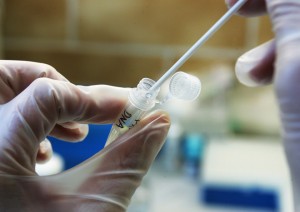Investigators in France have been using DNA testing to discover who sexually assaulted a teenage girl in a high school, according to the Associated Press.
On Monday, April 14, the testing of 500 male students and staff in Fenelon-Notre Dame High School commenced in two large lecture halls with DNA swabs. The testing is expected to end on Wednesday, April 16, and students as young as age 14 will be tested, according to the Huffington Post.

AP Photo.
The investigation is an unprecedented effort to find the person responsible for sexually assaulting a teenage girl inside a dark bathroom in Fenelon-Notre Dame High School last September. The victim was unable to identify the assailant at the time of the assault, but police were able to retrieve a DNA sample from her clothing. Seven months later, police are now investigating to discover a DNA imprint from one of the male high school students and faculty that matches the imprint discovered last Fall. No matches were found so far, according to AP.
This method of investigation could raise questions of ethical concern. According to AP, children’s “civil liberties” are respected in the country. But the issuing of the DNA tests in a school setting could say otherwise.
According to the Chantal Devaux, the school’s director, there is not a method more logical to discover the person responsible, especially since police already have a DNA imprint.
“This happened during the school day in a confined space,” Devaux told French media, according to AP. “The decision to take such a large sample was made because it was the only way to advance the investigation.”
Prosecutor Isabelle Pagenelle said the search for the DNA match should be as quick as possible, even if it means testing hundreds of students at a private school.
“The choice is simple for me,” she said, according to AP. “Either I file it away and wait for a match in what could be several years, or I go looking for the match itself.”
France’s privacy policy is strict, AP reported. The French government’s DNA database includes over two million profiles and has expanded greatly since its first launch in 1998. The high school DNA testing also reflects that. Police have promised, however, to discard the genetic material once they have discovered that it does not match the original imprint.







